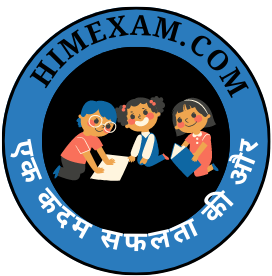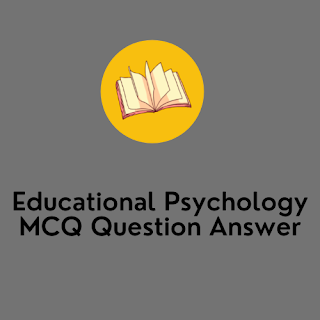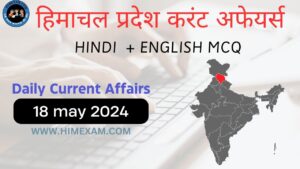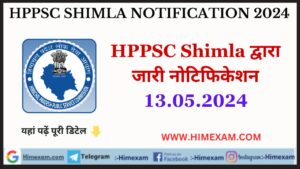Table of Contents
ToggleEducational Psychology MCQ Question Answer In English
|| Educational Psychology MCQ Question Answer fo hptet || Educational Psychology MCQ Question Answer htet || Educational Psychology MCQ Question Answer | for ctet | Educational Psychology MCQ Question Answer for uktet || Educational Psychology MCQ Question Answer for uptet ||
1. Which of the following is the subject matter of psychology?
(A) soul
(B) Manas
(C) Man
(D) behavior
2. Psychology was initially part of which of the following?
(A) Philosophy
(B) Logic
(C) Physics
(D) Sociology
3. Which of the following psychologists define psychology as the science of consciousness?
(A) William James
(B) James Surly
(C) William Wunt
(D) All these
4. Which of the following psychologists consider psychology to be the science of behavior?
(A) J.R. B. Watson
(B) Pillsbury
(C) William McAdugal
(D. ALL OF THE ABOVE
5. Which of the following is the nature of psychology?
(A) Philosopher
(B) Artistic
(C) Scientist
(D) Literary
6. Education Psychology is important
(A) For teacher
(B) For the student
(C) For the guardian
(D) For all of the above
7. Education-Psychology is helpful
(A) Discipline
(B) Knowledge of child development
(C) Evaluation
(D) All-round development
8. Education Psychology is helpful
(A) Understanding oneself
(B) Understanding the child
(C) In the selection of teaching methods
(D) In the whole educational process
9. Whose definition is it? “Psychology is the basic science of education.”
(A) Davis
(B) Skinner
(C) B.B. N. Jha
(D) None of these
10. Education does not mean
(A) ‘Sa Vidya or Vimuktaye’
(B) ‘Gyanam Manujasya Tirtha Netran’
(C) Development of qualifications
(D) Physical development
11. Psychology has real meaning
(A) Science of soul
(B) Brain science
(C) Science of consciousness
(D) Science of Behavior
12. Psychology is
(A) Social Science
(B) MLA Science
(C) Pure Science
(D) Natural Sciences
13. Which scholar presented this definition, first of all psychology sacrificed its soul and then renounced its mind or brain. He then renounced consciousness. Now it accepts the method of behavior
(A) Co and Crow
(B) James William
(C) R.K. s. Woodyarth
(D) B.R. F. Skinner
14. From which scripture has psychology originated.
(A) Spirituality
(B) Biology
(C) Anthropology
(D) Philosophy
15. Psychology was first called whose science?
(A) mind
(B) soul
(C) consciousness
(D) All these
16. What did psychology first lose to the soul, and not after it?
(A) Subliminal
(B) behavior
(C) consciousness
(D) All these
17. When was psychology called the science of consciousness?
(A) In the fourth century BC
(B) In the middle of the twentieth century
(C) At the end of the nineteenth century
(D) In the eighteenth century
18. Psychology is considered a science in modern times.
(A) realization
(B) Mental process
(C) behavior
(D) None of these
19. What type of science is psychology?
(A) MLA
(B) Regulatory
(C) Both (A) and (B)
(D) None of the above
20. Currently studying the subject of education psychology
(A) consciousness
(B) brain
(C) Human behavior
(D) soul
21. The nature of education psychology is scientific, because
(A) It only studies science
(B) In education psychology, the principles were formed on the basis of information only.
(C) The behavior of the learner in the educational environment is studied through scientific methods.
(D) It only studies the behavior of the students
22. is the originator of the principle of timeliness
(A) R. M. Ganne
(B) Vardimar and others
(C) B.B. s. Bloom
(D) B.R. F. Skinner
23. Education is the center of psychology
(A) Child
(B) Teacher
(C) Learning materials
(D) course
24. Psychology is at the present time
(A) Science of brain
(B) Science of Behavior
(C) Science of consciousness
(D) Science of soul
25. Teacher should study education psychology so that
(A) Easily impress the student
(B) understand yourself
(C) Can do experiments on animals
(D) make teaching more effective
26. Education psychology is not useful in which of the following?
(A) Detection of mental illness of children
(B) In the selection of teaching methods
(C) In motivating the jatra
(D) In experiments on animals
27. Origin of the term Psychology from which language
(A) English
(B) Tight
(C) latin
(D) Spanish
28. ‘Psychology is a pure law of behavior’. Statement
(A) Yudworth
(B) James Drewer
(C) Watson
(D) Skinner’s
29. The Latin word ‘psycho’ means
(A) mind
(B) consciousness
(C) behavior
(D) soul
30. According to which of the following astrologers, education is the process of ‘exerting the powers of the person’?
(A) Froebel
(B) Pastology
(C) Thorndike
(D) Plato
31. Which of the following statements most correctly reveals the meaning of education psychology?
(A) It is the science of studying the mind of a person
(B) It constitutes the experiences of a person
(C) It only deals with social processes of the individual
(D) It provides psychological basis to education
32. Psychology Behavior and the science of cognition decided
(A) Fifth century BC From the sixteenth century
(B) In the seventeenth century
(C) In the eighteenth century
(D) In the nineteenth century
33. were supposed to consider psychology as the science of behavior
(A) Watson
(B) Plato
(C) Aristotle
(D) Bunt
34. A psychologist said that “Give me a baby and tell me what to make of him – engineer, doctor or others.” He was a psychologist
(A) Woodworth
(B) Watson
(C) Skinner
(D) James Draver
35. “The main purpose of consciousness is to provide security to our lives. Therefore, the study of the effects of consciousness on different organs of the body should be a specific area of psychology, not just the study of consciousness.” Underline to which psychologist the credit of this statement goes.
(A) William James
(B) Watson
(C) Veshikh
(D) Pavlov
36. “In education psychology ‘learning’ is to determine the measures to reach the goal. The category of learning it falls into is
(A) learning process
(B) Learning features
(C) Rules of learning
(D) Principles of learning
37. The popular book written by Watson and published in the year 1925 is
(A) Animal Psychology
(B) Psychology in terms of behaviorist
(C) Pragmatism
(D) Child Psychology
38. Who established the first laboratory of psychology?
(A) W. Bund
(B) Sigmund
(C) Pilove
(D) Watson
39. Which of the following best reflects the nature of education-psychology?
1. Positive Science
2. Regulatory science
3. Behavioral Sciences
Sort out the correct answer using the above code
(A) 1 and 2
(B) 2 and 3
(C) I and 3
(D) 3 only
40. Education is the main focus of psychology.
(A) Teacher as an instructor
(B) The learner as a person
(C) Teaching method as an array
(D) Situation as an environment
41. What is the method of person study in psychology?
(A) inspection
(B) experiment
(C) Insight
(D) All these
42. Which of the following is the best method of study in psychology?
(A) inspection
(B) experiment
(C) Insight
(D) All these
43. Which of the following is the least authentic method of study in psychology?
(A) inspection
(B) experiment
(C) Insight
(D) Questionnaire
44. In psychology, which of the following psychological problems of a person is diagnosed?
(A) inspection
(B) experimental
(C) Person History
(D) Questionnaire
45. Inspection is done in the method
(A) our study
(B) Explain its behavior
(C) Study of others
(D) behavior analysis
46. Education Psychology is-
(A) Pure Science
(B) Applied Science
(C) Standard Science
(D) None of the above
47. Life is studied in developmental psychology
(A) in pregnancy
(B) By birth
(C) lifetime
(D) in adolescence
48. Which of the following is the nature of education psychology?
(A) Art
(B) Science
(C) applied science
(D) None of the above
49. Psychology has the biggest c contribution in the field of education.
(A) Subject Focused Education
(B) Teacher-centered education
(C) Verb-centric education
(D) Child-centered education
50. Psychology was initially a part of which subject?
(A) Philosophy
(B) Ethics
(C) Logic
(D) Physics
51. The field of child psychology is
(A) Study of characteristics of infancy only
(B) Study of characteristics of pregnancy only
(C) Study of characteristics of childhood only
(D) Study of characteristics of pregnancy to adolescence
52. Which statement is best based on child psychology?
(A) All children are the same
(B) Some children are the same
(C) Some children are special
(D) Every child is unique
53. Child psychology has a focal point.
(A) Good teacher
(B) Child
(C) teaching process
(D) School
54. According to Child Psychology, the main place in the field of education is
(A) Child
(B) Teacher
(C) Parent
(D) Administrator
55. Which one of the following statements is true from the point of view of education psychology?
(A) Children create their own knowledge
(B) Children do not have complete knowledge before coming to school
(C) Children suffer in learning process
(D) Children learn exactly what they are taught
56. Which statement is best for a teacher?
(A) Every child can learn
(B) Some children can learn
(C) Most children can learn
(D) Very few children can learn
57. Which one of the following statements is true from the point of view of education psychology?
(A) Children create their own knowledge
(B) Children do not have any prior knowledge before coming to school
(C) Children suffer in learning process
(D) Children learn exactly what they are taught
58. How does a child learn?
(A) By reading books
(B) by discussion
(C) By asking questions
(D) in many ways
59. Which of the following education is the most subjective method of psychology?
( A) Insight
(B) Extrusion
(C) Overview
(D) Experimentation
60. Which of the following options is a limitation of education psychology?
(A) Knowledge of different stages of child development
(B) solve class problems
(C) Child-centered education
(D) Problem of individual differences
61. Modern Psychology means
(A) Study of mind
(B) Study of soul
(C) Study of the body
(D) Study of behavior
62. What is considered to be the year of the origin of education psychology?
(A) 1947
(B) 1920
(C) 1940
(D) 1900
|| Educational Psychology MCQ Question Answer fo hptet || Educational Psychology MCQ Question Answer htet || Educational Psychology MCQ Question Answer | for ctet | Educational Psychology MCQ Question Answer for uktet || Educational Psychology MCQ Question Answer for uptet ||
Read More: – Himachal Pradesh General Knowledge






1 thought on “Educational Psychology MCQ Question Answer In English”
It gave a very nice information about my exam topic education psychology….tq ….I got some points to write in my exams…tq tq so much…..
Comments are closed.